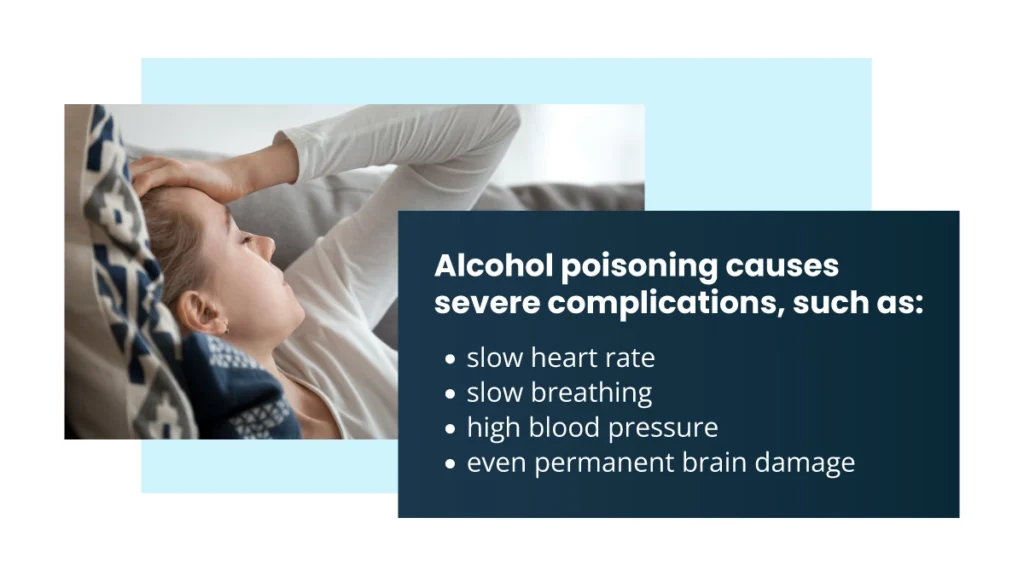Alcohol poisoning, a potentially life-threatening condition, occurs when an individual consumes a large amount of alcohol in a short period. It happens when the body is overwhelmed by the toxic effects of alcohol, leading to a range of severe symptoms that require immediate medical care.
Understanding the risks, recognizing the signs, and knowing how to respond can save lives and ensure a safer drinking environment. Continue reading to learn important health information to keep you and your loved ones safe from the consequences of alcohol poisoning.

Key Takeaways
Alcohol poisoning occurs when the body is overwhelmed by excessive alcohol consumption in a short time. Here is what you need to know:
- The body processes alcohol through the liver, with enzymes converting it into less harmful substances.
- Recognizing the causes, signs, and effects of alcohol poisoning is crucial to respond effectively and seek help promptly.
- Calling 911, staying with the person, and providing comfort are essential steps in aiding someone with alcohol poisoning.
- Responsible drinking, staying hydrated, and being aware of your limits can help reduce the danger of alcohol poisoning.
Contact The Haven Detox-New England at (844) 933-4145 to start the journey towards overcoming alcohol addiction and leading a healthier, addiction-free life.
Alcohol Breakdown: What Happens Inside Your Body
Alcohol metabolism in the body is a complex process that impacts how we feel and function after consuming alcoholic beverages. When we drink alcohol, our body immediately begins to metabolize it. This means that the body processes and breaks down the units of alcohol to eliminate it from our system.
First, alcohol is absorbed through your stomach and small intestine into the bloodstream. It doesn’t need to be digested like food, which is why you can feel its effects quickly. Once in the bloodstream, the liver takes the lead.
The liver is the primary organ responsible for alcohol metabolism. It produces enzymes that convert alcohol into acetaldehyde, a toxic substance. This acetaldehyde is further broken down into acetate, a less harmful compound, and eventually into carbon dioxide and water, which can be expelled from the body easily.
The rate at which alcohol breaks down depends on various factors, including age, weight, genetics, and the presence of food in the stomach. As the liver works to metabolize alcohol, it affects our cognitive and physical functions, leading to the feeling of being drunk.
Understanding alcohol metabolism is essential for responsible drinking. It’s important to know that your body can only process alcohol at a specific rate, and overconsumption can lead to alcohol poisoning. Being informed about the process helps avoid harm and make safer choices.
Understanding Alcohol Poisoning
Alcohol poisoning is a severe and potentially life-threatening medical condition that arises from consuming excessive amounts of alcohol in a short time. It’s vital to recognize its causes, risk factors, signs, and symptoms to ensure your safety and those around you.
Causes and Risk Factors
Alcohol poisoning typically happens when someone drinks alcohol at a dangerous level that the body cannot metabolize quickly enough. Key causes and risk factors include:
Excessive Drinking: The major cause of alcohol poisoning is consuming large amounts of alcohol rapidly. This can happen when people engage in binge drinking, often at parties, celebrations, or during drinking games.
Alcohol Content: The type of alcoholic beverage matters. Drinks with a higher concentration of alcohol, such as hard liquor or spirits, are more likely to lead to alcohol poisoning when consumed in large quantities.
Tolerance and Body Weight: A person’s tolerance for alcohol and their body weight can influence how alcohol affects them. Individuals with lower alcohol tolerance or smaller body size, such as young adults, are at greater risk of alcohol poisoning.
Mixing Substances: Combining different forms of alcohol with other drugs, such as prescription medications or illicit substances, can intensify the effects of alcohol and increase the chance of poisoning.
Signs and Symptoms
Identifying the signs and symptoms of alcohol poisoning allows for early intervention and potentially saves a life.
- Confusion: The affected person may be disoriented, confused, or unable to stay awake.
- Vomiting: Repeated vomiting, especially if unconscious or semi-conscious, can be a sign of alcohol poisoning.
- Seizures: In some cases, alcohol poisoning can trigger seizures, which are a medical emergency.
- Slow or Irregular Breathing: Breathing may become slow, irregular, or even cease altogether.
- Hypothermia: A person with alcohol poisoning may have cold, bluish, or clammy skin due to low body temperature.
- Hypoglycemia: Alcohol can lead to low blood sugar levels.
- Unconsciousness: Alcohol poisoning can lead to a loss of consciousness, and the person may be unresponsive, unable to wake up, or even in a coma.
If you encounter someone exhibiting these symptoms of alcohol overdose, call 911 or your local emergency number and seek medical help immediately. While waiting for emergency personnel to arrive, try to keep the person awake and sitting up if possible.
How to Assist Alcohol Poisoning Cases
Helping someone experiencing alcohol poisoning is a potentially life-saving task. Knowing what to do can make all the difference. Here’s a guide to assist you in such a situation.
Call for Emergency Assistance
If you suspect someone has alcohol poisoning, call 911 or your local emergency number right away. Don’t hesitate or try to manage the situation alone. Professional medical assistance is vital in these cases.
Stay with the Person
While waiting for medical care to arrive, stay with the affected person. It’s important not to leave them alone, especially if they’re unconscious. Try to keep them sitting up if they’re conscious and responsive.
Monitor their Breathing
Watch the person’s breathing carefully. If they’re having difficulty breathing or if their breaths are very slow or irregular, it’s essential to be prepared to perform CPR if necessary. If you need help with how to do this, emergency dispatchers can guide you.
Prevent Choking
If the person is vomiting, try to turn their head to the side to prevent choking. It’s essential to clear vomit from their mouth and nose to avoid any blockage to their airway.
Provide Information to Medical Professionals
When emergency services arrive, please provide them with as much information as possible. Details such as the amount and type of alcohol consumed, any other substances taken, and the person’s symptoms can be helpful for medical professionals to provide appropriate care.
Offer Support and Reassurance
In a situation like this, the affected person may be scared or confused. Reassure them and try to keep them calm until medical help arrives.
Remember that the best way to help someone with alcohol poisoning is to get them immediate medical attention. Your actions can save a life. It’s also a good idea to educate yourself and others about the dangers of excessive alcohol consumption to prevent such emergencies in the first place.
Smart Choices: Preventing Alcohol Poisoning
Preventing alcohol poisoning involves making informed choices and being mindful of alcohol consumption. Here are some practical tips to reduce the risk:
Know Your Limit: Understand your body’s tolerance for alcohol and your limits. Avoid trying to keep up with others if it means drinking beyond what you can handle.
Stay Hydrated and Eat: Drink water before and after every alcoholic drink, and don’t consume alcohol on an empty stomach. Eating and staying hydrated can help your body process alcohol more efficiently.
Avoid Binge Drinking: Avoid consuming large quantities of alcohol in a short time. Pace yourself and give your body time to metabolize the alcohol.
Mix with Caution: Be cautious when mixing alcohol with other substances, including medications. Some combinations can be dangerous.
Designate a Driver: If you’re going out with a friend and plan to drink, have a designated driver or arrange for a safe ride home in advance. Never drink and drive.
Look Out for Friends: Keep an eye on your friends and ensure they’re not overindulging. If you suspect someone may have had too much to drink, intervene and seek medical help if necessary.
Know When to Say No: Don’t be afraid to decline more drinks, even if encouraged to continue. Your safety is the top priority.
Underage Drinking: If you’re underage, you must abide by the legal drinking age. Law is in place to protect your health and safety.
Educate Yourself: Learn about the signs of alcohol poisoning and the importance of seeking help if you or someone you’re with shows those signs.
Being aware of the risks and making responsible choices can significantly reduce the likelihood of alcohol overdose. Enjoying alcohol in moderation and being mindful of your and others’ well-being is key to a safe and enjoyable social experience.
Frequently Asked Questions (FAQ)
Is alcohol intoxication the same as poisoning?
No, acute alcohol intoxication is not the same as poisoning. Intoxication refers to being drunk, while poisoning is a potentially life-threatening condition caused by a large quantity of alcohol use in a short time. Alcohol poisoning symptoms can be severe.
How much alcohol causes alcohol poisoning?
The number of drinks that lead to poisoning varies. It depends on factors like weight, tolerance, and speed of drinking. But, consuming a lot of alcohol in a shorter time frame can cause alcohol poisoning.
Choose Sobriety, Choose The Haven Detox-New England
Do you or a loved one struggle with alcohol addiction? Recovery is possible with the support of The Haven Detox-New England, a specialized treatment center.
Our comprehensive services include a medical detox program to rid your body of harmful substances and residential rehab for round-the-clock care.
Our medical staff specializes in offering a dual diagnosis program for those battling with mental health issues or alcohol abuse simultaneously.
Don’t wait. Contact us now at (844) 933-4145. We’re here to guide you on your path to recovery.
Verify Insurance
Let’s get you or a loved one help with a few simple steps.
-
Alcoholism Treatment




